
Behind every memorable event, there lies a carefully crafted plan, a blueprint that turns ideas into experiences.
Whether it’s a virtual conference, an in-person celebration, or a hybrid gathering, successful events depend on organizing many moving parts seamlessly.
You might be planning to host your first event or aiming to build a career in event management. This guide will walk you through essential steps and tips for creating a flawless experience, no matter the format.
Also, you will learn about some smart tools to make your event smoother and hassle-free.
Let’s start.
What is Event Planning and Why Does It Matter?
Event planning is a structured process and a detailed guide to outline, organize, and manage all the elements that bring an event to life, whether it’s a virtual webinar, an in-person celebration, or a hybrid experience.
No matter what type of event you’re planning, whether it’s a large-scale conference, a small in-person gathering, or a virtual meetup, your event plan acts as a roadmap, keeping everything on track from the initial concept to post-event follow-up.
Successful events don’t happen by chance; they require careful planning. And, to run a successful event, perfect planning is very crucial, because it;
- Helps the event fulfill its original purpose, whether it’s engagement, education, promotion, or celebration
- Allows for the setup of on-site or virtual protocols that protect and guide attendees throughout the event
- Ensures that services like catering, tech, music, and staff are aligned and operate seamlessly
- Let guests enjoy their time, and they are more likely to engage and return with a smooth flow
- Make the events more likely to deliver measurable results with clear planning and goal tracking
In short, the success of any event, big or small, starts with a thoughtful plan. It’s what turns ideas into impactful experiences.
12 Steps of How to Plan and Host an Event
Planning an event might seem simple at first, but once you dive in, the confusion quickly builds, and your ideas can start to scatter. But with a few clear steps, you can bring structure to the chaos and confidently plan a successful event.
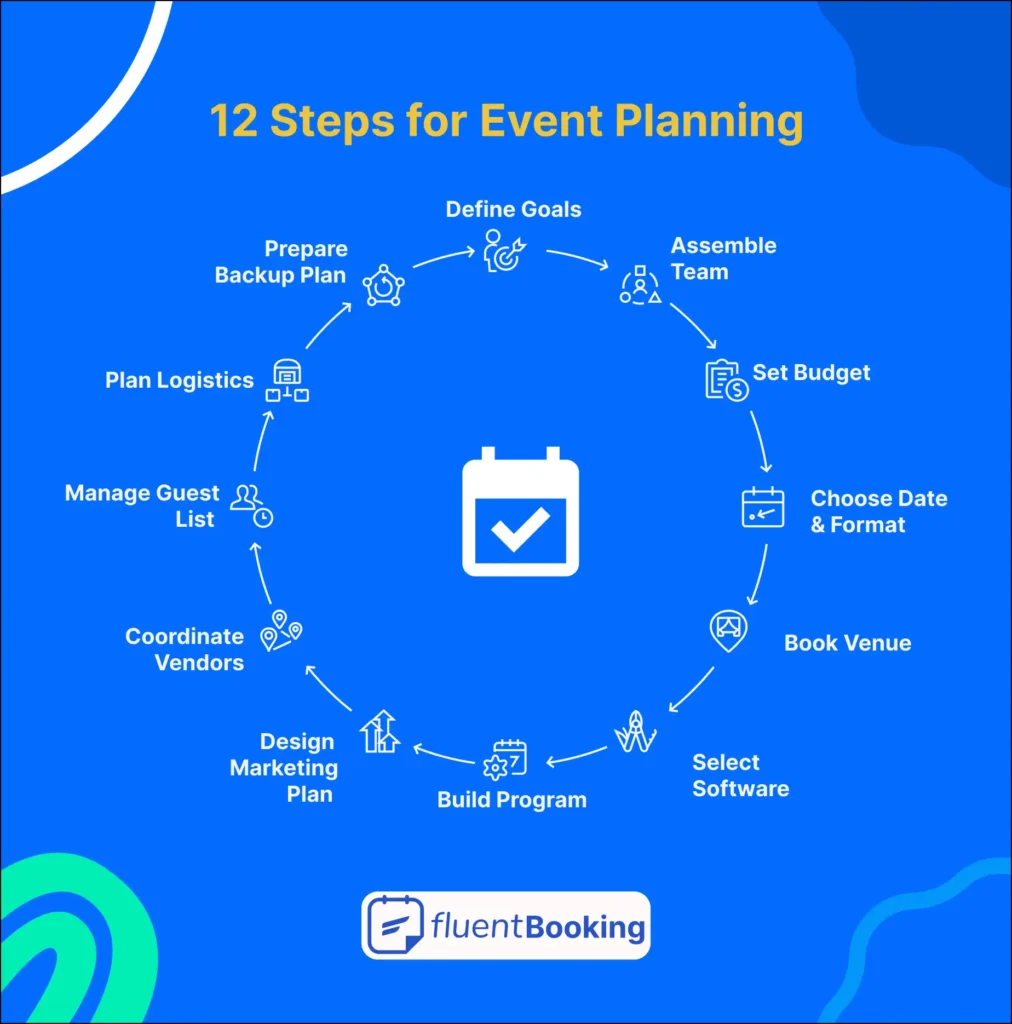
Define Your Event Goals and Audience
Before diving into the logistics, take a step back and ask: Why are we hosting this event? This is the foundation of your entire planning process.
Your event goals could include raising awareness, generating leads, boosting member engagement, or launching a product. Once you’re clear on the purpose, you can shape the experience around what matters most.
Here are a few questions to guide you:
- What is the core purpose of this event?
- Who is your target audience?
- What does success look like? (Think: attendance, engagement, revenue, or feedback.)
Setting clear, measurable goals will not only align your team but also help you track success.
Assemble Your Team and Assign Roles
Planning an event isn’t a one-person job. It takes a dedicated team with clear responsibilities and strong communication.
Start by appointing an experienced event manager to oversee the entire process. Then, build a support team with defined roles like:
- Content & Programming Lead
- Marketing Coordinator
- Logistics Manager
- Tech Support Specialist
- Guest Experience or Volunteer Coordinator
- Venue management expert
- Photography or videography manager
Assigning roles early to the experts creates accountability and helps the team work more efficiently. Regular check-ins and updates will keep everyone aligned and proactive.
Set a Realistic Budget
Setting a realistic budget early on will help you stay focused, avoid overspending, and make smart decisions throughout the planning process.
While every event is unique, here are the key expenses you should consider:
- Venue or platform: This includes the cost of renting a physical space or subscribing to a virtual platform. Don’t forget to include additional charges like insurance, permits, security, or tech add-ons.
- Food, drinks, or attendee gifts: Whether it’s a catered lunch, a cocktail reception, or sending coffee kits and swag bags to remote attendees, hospitality matters. Plan based on your guest count, and don’t forget shipping or delivery costs if applicable.
- Speakers and entertainment: Speaker fees, travel, accommodations, or honorariums can quickly add up.
- Marketing and promotion: Budget for everything from email campaigns and paid ads to print materials and signage.
- Technology and A/V support: From projectors and microphones to livestream tools and internet boosters, tech is essential. Plan for setup, support, and any gear rentals you’ll need before and during the event.
- Staff and volunteers: You may need to hire people to help with logistics, registration, tech, or guest services. Even if you rely on volunteers, you’ll likely need to provide training, meals, or small thank-you gifts.
- Software and tools: Consider the cost of tools for registration, scheduling, communication, and task management.
- Contingency fund: Something unexpected always comes up. Build a buffer of about 10–15% of your total budget for last-minute needs, price increases, or backup plans.
A well-thought-out budget doesn’t just control costs, it frees you up to be more creative, confident, and calm as your event comes together.
Choose a Date, Time, and Format
The “when” and “how” of your event matter just as much as the “why.”
Picking the right date and time may sound simple, but it can make or break your event. Whether it’s your first event or an annual tradition, a little planning here goes a long way.
Here’s what to keep in mind before locking in your event date:
- Time zones (especially if you’re going global)
- Enough time for planning and preparation
- Venue or platform availability
- Weather and travel conditions for physical events
- Ideal timing for your audience (weekday vs. weekend, morning vs. evening)
Once you’ve chosen your date and format, whether in-person, virtual, or hybrid, you can move forward with booking venues.
Book Your Venue
Once your event date is locked in, booking the venue should be next on your list. You can’t promote an event without a confirmed time and place, so treat this as a top priority.
If you’re flexible on dates, you may find better availability or pricing, especially for popular locations.
Here are a few things to keep in mind when choosing your venue:
- Accessibility: Make sure it’s inclusive, with elevators, ramps, accessible restrooms, and space for interpreters or captioning if needed. Everyone should feel welcome and comfortable.
- Capacity: Match the space to your expected attendance. Do you need breakout rooms, networking lounges, or even a quiet area for speakers and VIPs?
- Location & parking: Is it easy to find? Is there public transportation nearby? What about parking availability or ride-share access?
- Insurance & permits: Know what coverage is required and whether the venue provides it. Ask about liability policies and cancellation terms before you sign anything.
- Tech setup (A/V): From microphones to projectors to fast, reliable Wi-Fi—confirm that the venue can handle your event’s technical needs.
- Cost: Understand the full breakdown. Are there hidden fees for overtime, cleaning, or security? What’s refundable if things change?
Booking the right venue isn’t just about looks; it’s about logistics, comfort, and making your event experience seamless from the first step in the door.
Choose the Right Event Management Software
The right event management software can save you hours of coordination and give your attendees a smoother experience from start to finish.
These platforms help with everything from promotion and registration to on-site signage and post-event follow-up.
Here are some key features to look for:
- Project management tools: Keep your internal team organized with shared task lists, timelines, and dashboards with a tool like FluentBoards.
- Event Scheduling tool: Use an automated scheduling tool where the attendees can book any event by themselves and save your time. By using appointment booking tools like FluentBooking, you can easily schedule a group one-off event and also send automated confirmation and reminder notifications.
- Registration and ticketing: Make it easy for attendees to sign up and pay.
- Live streaming and recording: Ensure smooth delivery for virtual or hybrid sessions.
- Marketing automation: Run email campaigns, paid promotions, and follow-ups with ease. You can use a CRM tool like FluentCRM on your WordPress website to control all things from a single dashboard.
- Event website builder: Create a landing page or full website with agendas, bios, and registration, which supports all the features for both in-person and virtual attendees without juggling multiple tools.
Smart Scheduling for Smoother Events!
Automated Booking, calendar integration or last-minute reminders, FluentBooking keeps every detail in check
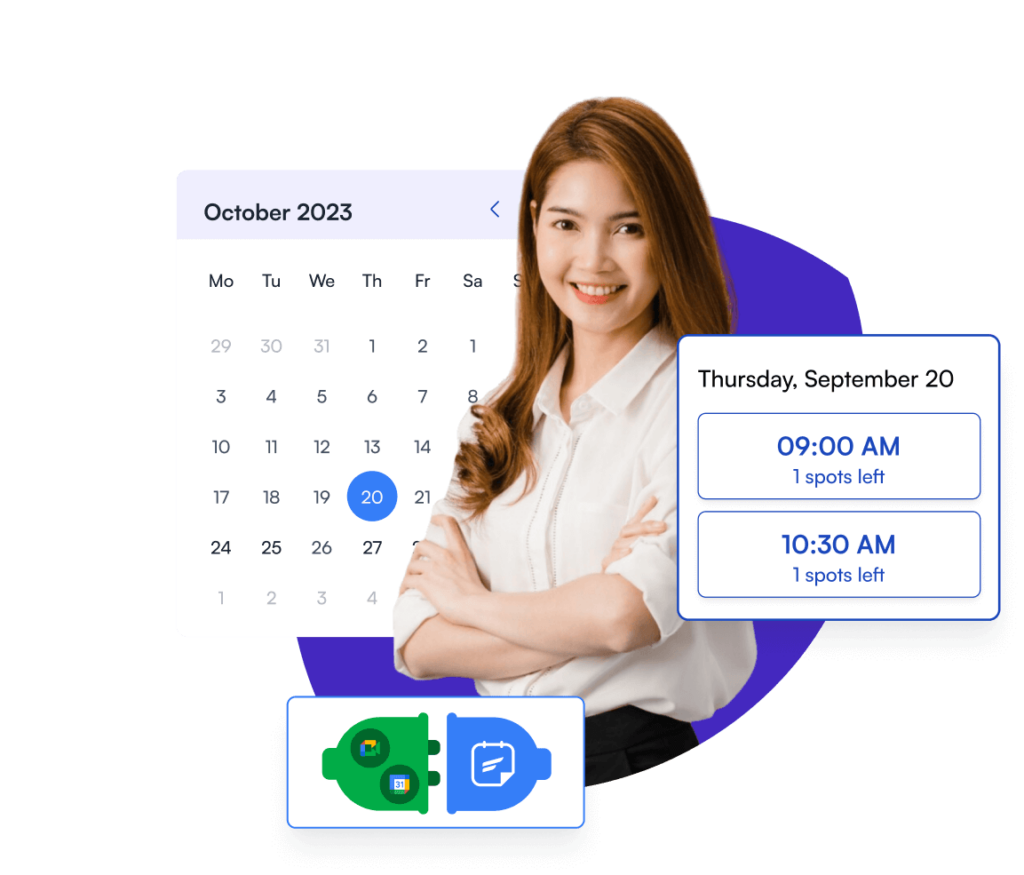
Build the Event Program and Timeline
Now it’s time to bring the experience to life.
Start by outlining your event program, including speaker sessions, panels, networking activities, entertainment, or workshops. Then build an event timeline that details everything happening, from setup to wrap-up.
Your timeline should include:
- Start and end times for each segment
- Speaker arrival and tech checks
- Breaks, meals, and transitions
- Backup sessions or buffer time
The goal? Keep the day flowing while giving guests time to recharge and engage.
Design a Strong Marketing Plan and Event Website
If no one hears about your event, no one shows up. That’s why a strong marketing plan is essential to reduce no-shows at any event.
Map out your promotional timeline, starting at least 4–6 weeks before the event. Include:
- Email campaigns: Start with a save-the-date, automated follow-up with reminders, and close with a final “last chance” push.
- Social media content: Schedule engaging posts, event teasers, speaker spotlights, and behind-the-scenes clips. Add paid promotions to expand your reach.
- Partner and influencer promotion: Collaborate with sponsors, partners, or industry influencers to help spread the word to their networks.
- Press outreach and blog content: Announce the event through media releases, guest blogs, or thought-leadership articles related to your event theme.
Once people are interested, your event website or landing page becomes the go-to hub for all the details. Make sure it’s clear, informative, and easy to navigate. Include:
- Compelling event overview: Highlight the value of attending—what’s in it for them?
Agenda and speaker lineup: Showcase key sessions, activities, and who’s leading them. - Registration and ticketing: Make the sign-up process seamless with clear CTAs.
- FAQs and contact info: Anticipate common questions and provide an easy way to reach you.
Coordinate Vendors, Sponsors, and Partners
Vendors are the backbone of your event experience. From food and furniture to lighting and security, they bring your plans to life.
Start by listing out what services you’ll need, then source reliable vendors for essentials like:
- Catering and beverages
- AV and lighting equipment
- Furniture, tenting, and décor rentals
- Transportation and parking services
- Security and on-site staff
Some venues may already offer preferred vendor options, so be sure to ask before booking externally. If your event needs temporary staff, consider partnering with an agency or organizing a trained volunteer crew.
Manage the Guest List & RSVPs
Managing your guest list is more than just tracking numbers—it’s the foundation for delivering a thoughtful, personalized experience for many gathering events, like a Halloween party.
Start by creating a smooth registration process. Use sign-up forms to collect key information like:
- Full name and contact details
- Job title or role
- Dietary needs or accessibility requests
- Session or format preferences (in-person or virtual)
This data allows you to segment your audience, personalize messages, and plan logistics more effectively.
Tracking RSVPs in real-time helps you stay on top of expected turnout and make smarter decisions around seating arrangements, tech setup, printed materials, and catering (if applicable).
Plan On-Site and Tech Logistics
Great events run smoothly because the behind-the-scenes work is solid. Whether your event is in-person, virtual, or hybrid, planning the logistics is key.
For in-person events:
- Plan the venue layout with clear signage and easy check-in
- Set up health and safety measures
- Arrange food and drinks based on timing and guest needs
- Ensure accessibility and transportation options are available
For virtual or hybrid events:
- Use reliable streaming or webinar platforms
- Have tech support and moderators ready
- Add interactive tools like chat, polls, or breakout rooms
- Prepare backups in case of internet or platform issues
Prepare a Backup Plan (Plan B)
Even the best-laid plans can hit a snag—and that’s okay if you’re prepared.
Have a solid Plan B for things like:
- Speaker cancellations
- Tech issues or power outages
- Low attendance
- Bad weather (especially for outdoor events)
- Platform or access problems
Prepare backup slides, pre-recorded sessions, substitute speakers or hosts, and alternative venues (like indoor spaces). With the right contingencies, your attendees won’t even notice a hiccup.
Last-Minute Tips Before Your Event
The big day is almost here, and while most of your planning is done, a few last-minute checks can make all the difference. These final touches will help you stay calm, organized, and ready to deliver a great experience:
- Send final reminder emails to attendees
- Confirm media guests, speakers, and VIPs
- Do a final walkthrough of the venue or test your virtual platform
- Set up a central spot for your team to coordinate on the day
- Check the weather forecast and prepare accordingly
- Touch base with vendors and deliveries to ensure everything’s on schedule
- Review your event checklist one last time
- Charge and test all technical equipment
- Pack a kit with essentials like pens, chargers, and extra supplies
- Bring printed schedules, contact lists, and emergency plans
- Pack an extra outfit in case of emergencies
- Take a moment to relax and focus before the event begins
Ready, Set, Plan: Your Event Success Starts Here
Planning an event, whether it’s in-person, virtual, or a blend of both, takes time, intention, and a well-structured plan. From defining your event goals to managing logistics and promoting your experience, every step brings you closer to creating something memorable.
And with the right strategy, tools, and mindset, organizing a successful event doesn’t have to feel overwhelming. Start early, stay flexible, and keep your attendees’ experience at the heart of every decision.
So now that you know how to plan an event from start to finish, what are you waiting for? Your next big event begins with a single step.
Frequently Asked Questions
Ratul Ripon
I enjoy making complex ideas simple and engaging through my writing and designs. With a strong knowledge on content writing and SEO, I create technical content that’s both easy to understand and interesting.
Table of Content
Subscribe To Get
WordPress Guides, Tips, and Tutorials






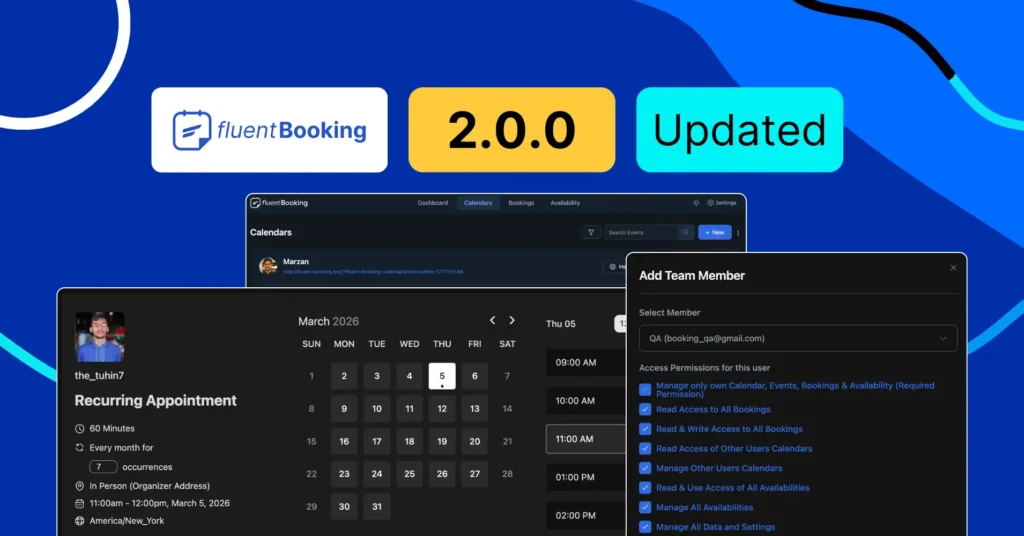
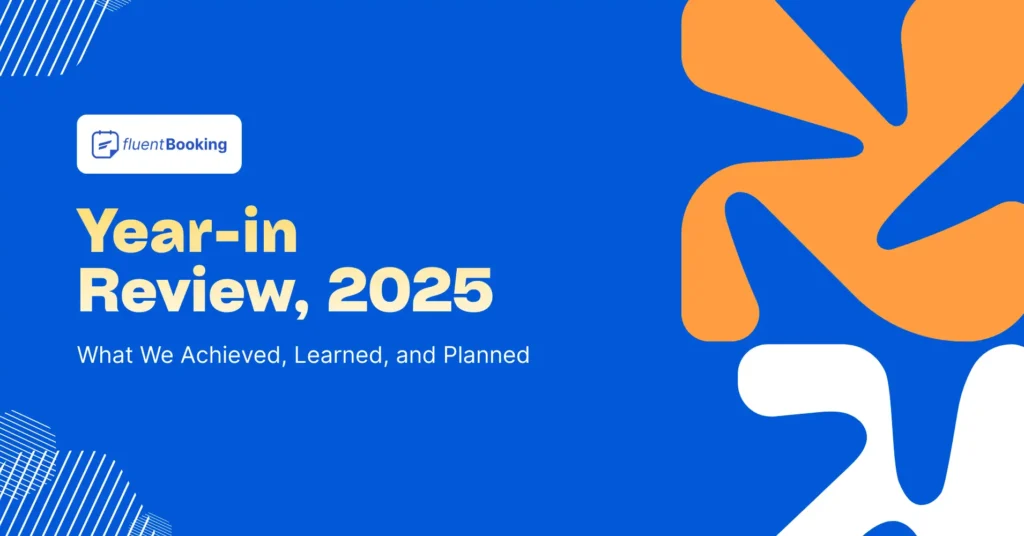
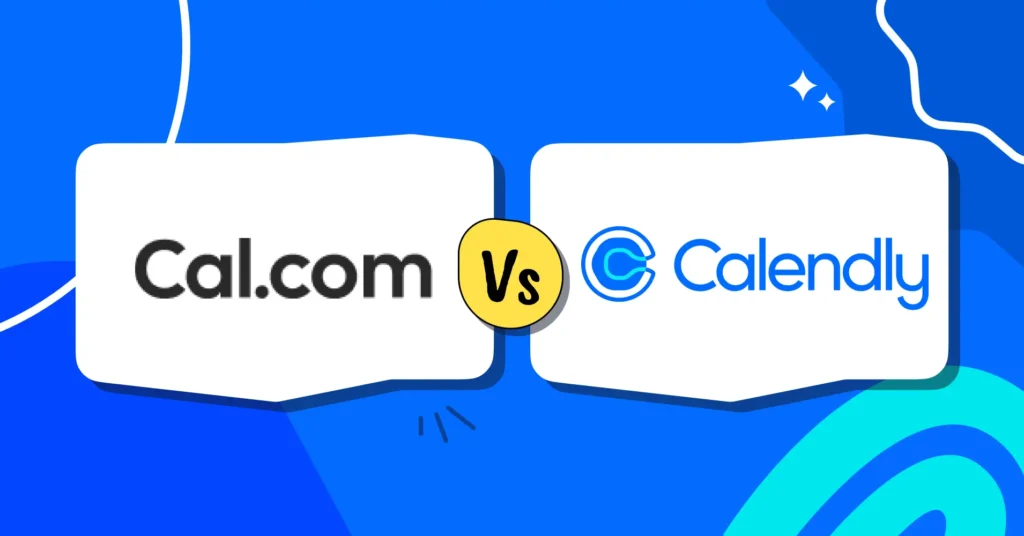


Leave a Reply